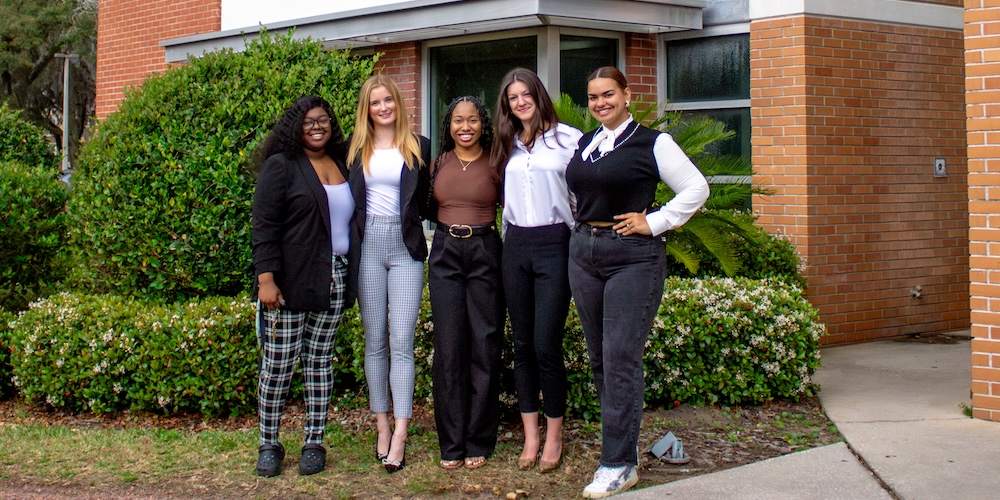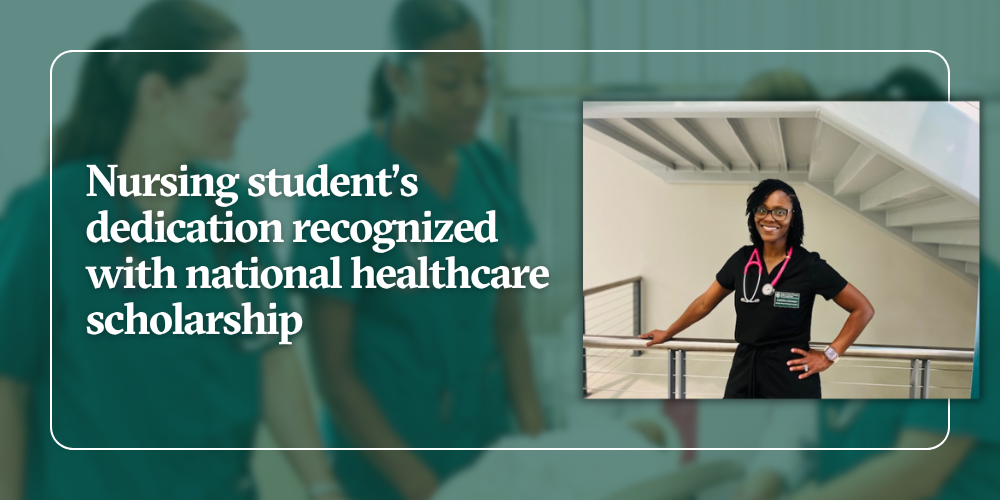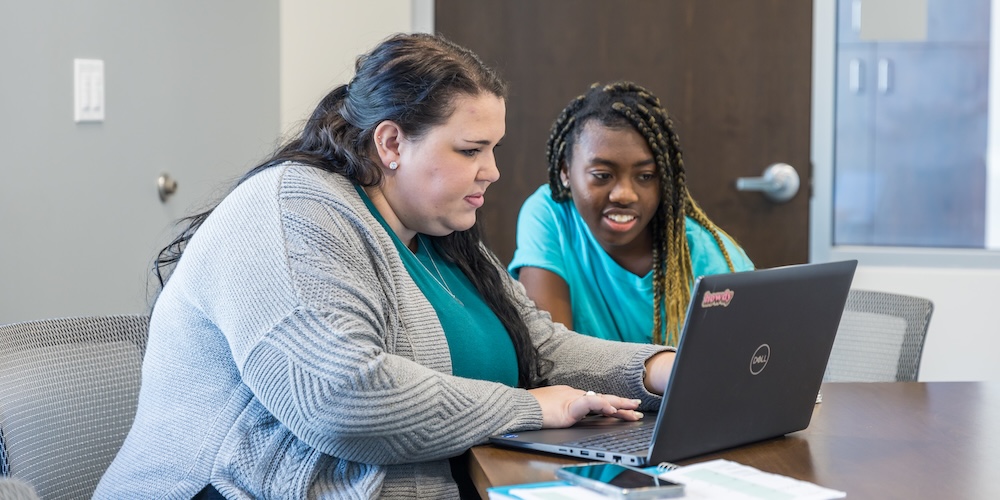The inaugural 2018-2019 Student Research, Creative Activity, and Scholarship (RCAS) program is a grant opportunity offered internally by the Jacksonville University (JU) Office of Research and Sponsored Programs (ORSP) made possible by a grant from the Arthur Vining Davis Foundations. The grant aids in funding innovative research and other forms of creative expression piloted by graduate and undergraduate students. Awardees of the grant will present their work at the annual Student Research Symposium held on Monday, April 1 and Tuesday, April 2 in the Davis College of Business.
Design and Test of a Drone System for Firefighting
Sergio Aponte and Diego Diaz Sanchez (undergraduate, mechanical engineering)
The RCAS awarded Aponte and Sanchez $1,000 for their research and plan to design, manufacture, and test a drone attachment that releases fire-extinguishing spheres that help prevent the spread of fires and save countless lives and property. Their project is a subset of a larger system developed in partnership with professors and students from Texas A&M University.
“With the increase of drone applications in the modern world, we saw an opportunity to help firefighters accomplish their mission,” Sanchez said. “This is our opportunity to solve a real-world problem. We’re not only gaining first-hand experience but also applying the knowledge we’ve obtained through our time at JU.”
Isolation of Acinetobacter baumannii phages from Jacksonville area water
Elizabeth Florida and Gibson Arias (undergraduate, biochemistry)
The advancement of modern medicine brings many advantages as well as issues to overcome. Arias and Florida recognized the increasing resistance of pathogens to current antibiotics. This issue causes healthcare professionals to turn to alternative treatments to cure infections because treatment options are becoming increasingly limited. With their awarded grant, these JU undergraduates are researching phage therapy as a solution.
In phage therapy, sediment samples and filtration techniques are used to grow bacteria and phages together in hopes of forming plaques that indicate phage growth and bacteria decline. From the formed plaques, viruses can be isolated and later amplified.
This research could not only create an extraordinary breakthrough for health science, but it is also giving the team the experience that will better prepare them for their future careers in academia as well as the professional world.
“Research is one of the few hands-on ways to prepare for grad school. It gives us experience in experimental design, general lab techniques, and biohazard and aseptic technique training. Independent, sink-or-swim lab time is an important handing off of responsibility that we will see every day in grad school,” says Arias.
After graduation, Florida plans to attend medical school with a specialty in oncology. “I am interested in the study of cancerous cells and rapid cell division,” she said. “One thing I’ve learned through my experience so far is that the possibilities students possess are immeasurable and this grant has allowed us to explore numerous opportunities.”
Movement Patterns of the Florida Peninsula Cooter (Pseudemys peninsularis)
Tabitha Hootman (graduate, marine science)
Though the Florida Peninsula Cooter and Red-bellied Turtle are considered the most common and integral part of the Florida freshwater ecosystem, there is little known about their habitat, home range, or migration patterns. Hootman’s research is the first to track migration and determine habitat requirements necessary to maintain survival. The information obtained from her research could benefit wildlife management and better inform policy-makers when making decisions about wildlife conservation.
“In my undergraduate program, I had an opportunity to work on a nesting study for Diamondback Terrapins. While participating, I was introduced to the turtle population studies in the Florida springs,” Hootman said. “Immediately, I knew that I’d found my passion working in the field with these amazing species.”
The grant awarded to Hootman’s research supports a full year of data set analysis, which will also serve as Hootman’s master’s thesis. After graduation, she plans to pursue a career in conservation. “I have come to realize that research in ecological communities is more complex than it appears. Many factors contribute to being able to perform the study. The study itself isn’t always straight forward, taking into account a wide range of biotic and abiotic factors,” she said. “The most intriguing takeaway is that the ‘answer’ to my research question has left me with many, many more questions.”
Characterization of Vibrio vulnificus in Timucuan Preserve Oysters
Janel Palomo (undergraduate, biology)
Vibrio vulnificus is a species of bacteria that reside in warm, saline water and may potentially cause the spread of deadly disease, either through open cuts or the consumption of raw shellfish. Palomo’s research seeks to differentiate between pathogenic and non-pathogenic strains in the oysters of Jacksonville’s Timucuan Preserve. She may uncover a possible correlation between the growth of bacteria and the salinity level of the water.
Currently, bacteria grown from oyster samples have been isolated and are being tested for traits, including the ability to evade immune system defenses or to rupture red blood cells. At the end of her research, all bacteria samples will be tested in varying levels of salinity for a better understanding of the preferred environment of the pathogenic bacteria.
“The university’s RCAS program supports students who want to go beyond what is taught in the classroom. It nourishes their learning experience and encourages curiosity, and I am honored to be selected for the program,” Palomo said. “It’s amazing to know that my university is willing to fund and support my research, especially as an undergraduate. Work that I am very passionate about.”
After graduation, Palomo plans to participate in the University’s Accelerated Master of Business Administration Program to prepare for a career in health or hospital administration.
“With the support of the university and my research advisor, Dr. Ouellette, I’ve been able to present my research findings at four conferences across the nation and discuss them with experts in the field,” she said. “The experience has helped me develop as a person, building self-confidence and enthusiasm for microbiology and medicine. It has definitely been an amazing undergraduate experience.”
For more details about Collaborate JU or the Florida EPIC Program, visit the project archive. To contact the Office of Research and Sponsored Programs, visit ORSP online. To learn more about JU’s upcoming Student Symposium on April 1-2, visit www.ju.edu/research/symposium.


